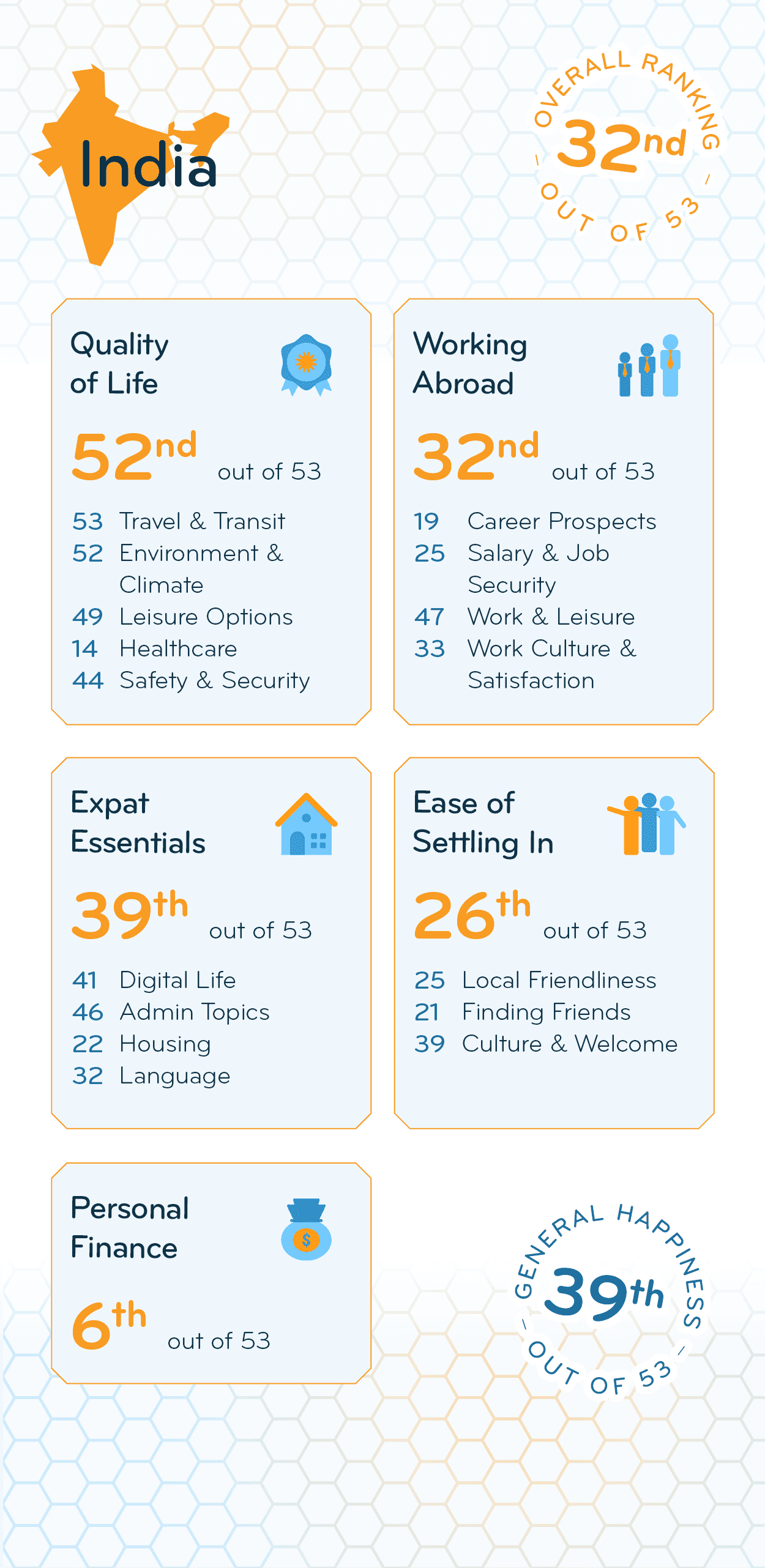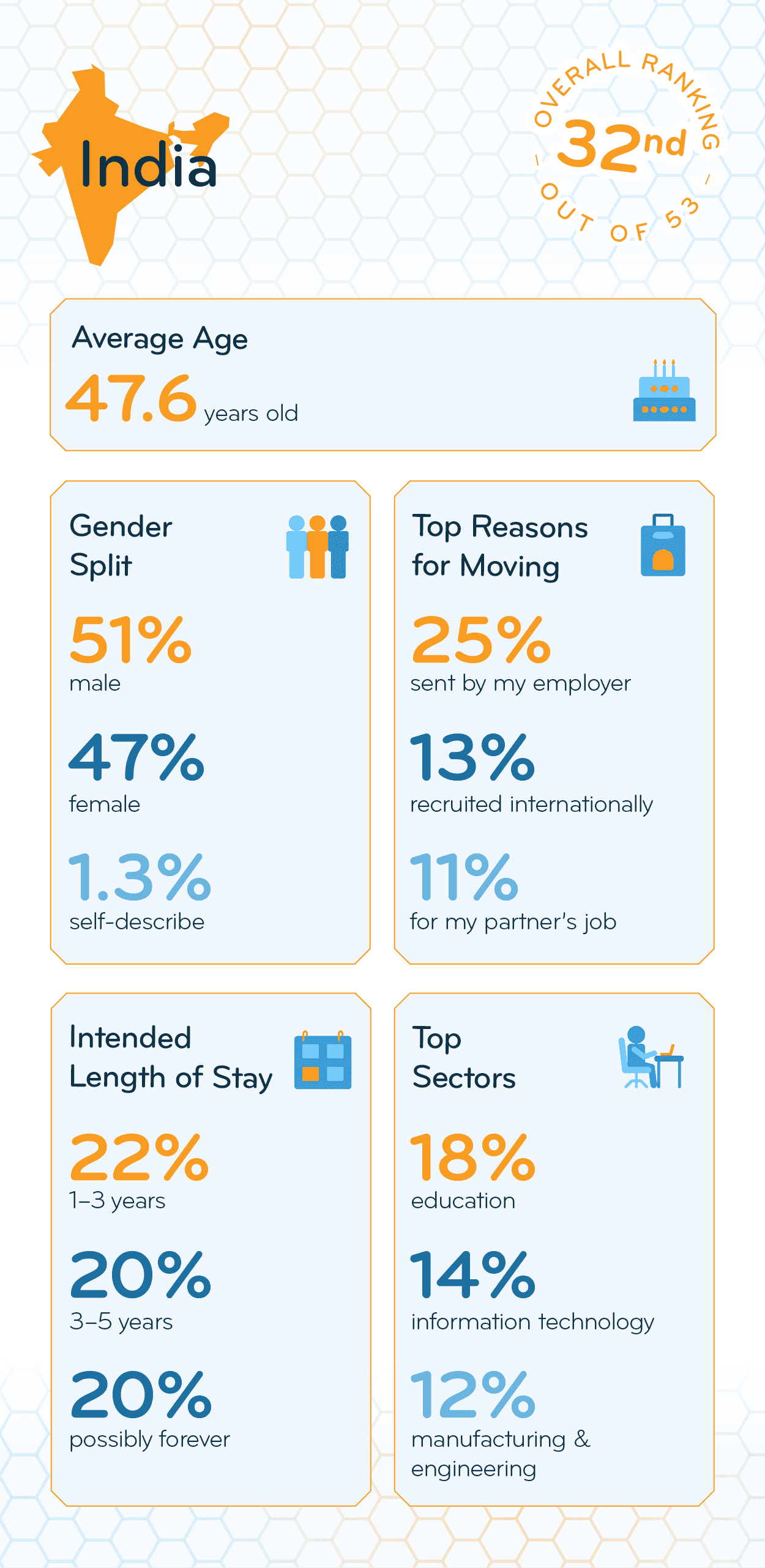Life in India Presents Quite the Mixed Picture
Expats in India are happy with their personal finances but struggle with quality of life, among other things.
India ranks 32nd out of 53 destinations in the Expat Insider 2024 survey. The country excels in the Personal Finance Index (6th) but presents challenges in other areas such as Work & Leisure (47th), Admin Topics (46th), and Digital Life (41st). The worst news, though? Expats are very dissatisfied with the Quality of Life in India (52nd).
How Expats Rate Life in India

Friendly Locals to Ease the Culture Shock
India secures the 26th spot in the Ease of Settling In Index, with average to good results in the Local Friendliness (25th) and Finding Friends (21st) Subcategories. Around two-thirds of respondents rate the general friendliness of the local residents positively (66% vs. 63% globally) and more than half (54%) agree it’s easy to make local friends, compared to just 38% of expats worldwide.
However, expats need to prepare for some culture shock. Close to two in five respondents (17%) share that this was a major point of concern for them before moving to India (vs. 11% globally). After living in the country, close to two in five respondents (37%) indeed find that the local culture is difficult to get used to (vs. 21% globally), ranking India 49th for this factor.
Comfortable Living
With an impressive 6th rank in the Personal Finance Index, India receives its best result in the survey. Expats regard the general cost of living (8th) favorably and feel that their disposable household income is sufficient to lead a comfortable life in India (4th). In fact, over two-thirds of respondents (69%) are satisfied with their financial situation (vs. 54% globally).
“Basic cost of groceries are cheap, and medical services and medication are affordable.” – Indonesian expat
Others agree, and rank India 12th and 15th, respectively, for the affordability and availability of healthcare. Over seven in ten respondents (71%) are happy with the quality of medical care (vs. 66% globally), too.
A Disappointing Quality of Life
Healthcare (14th), however, is the only area where India does well in terms of Quality of Life. The country ranks second to last in this index (52nd), and over two in five expats (22%) are unhappy with their personal safety in India (vs. 8% globally).
India places dead last in the Travel & Transit Subcategory (53rd). Respondents are satisfied with the affordability of public transportation (25th), but their views are much less positive about its availability (45th) or the infrastructure for cars (53rd). Close to half (47%) don’t agree that it’s safe to get around on foot or by bicycle, either (vs. 13% globally).
Results aren’t much better in the Environment & Climate Subcategory (52nd). India comes last for factors such as air quality (53rd) and urban environment (53rd), and close to a third (32%) rate the natural environment negatively (vs. 7% globally).
“I don’t like the air pollution or the challenging weather and climate, the noise, and the bad infrastructure.” – Hungarian expat
Bureaucratic Hurdles & Long Working Hours
Dealing with local bureaucracy (50th) is often an issue, and online government services aren’t readily available (40th). Factors such as obtaining a visa to move to India (30th) and opening a local bank account (48th) might add to the list of frustrations.
“The bureaucratic red tape can sometimes hinder efficiency in various processes, which can be frustrating.” – Kenyan expat
Offsetting these bad results, accommodation is comparatively affordable — 43% of expats rate housing costs positively (vs. 34% globally) — and not too hard to find (24th). Overall, India lands in 39th place in the Expat Essentials Index.
The Working Abroad Index (32nd) presents a similarly mixed picture. Over two-thirds of working respondents (68%) find they’re paid fairly for their work (vs. 58% globally). And around three in five expats in India are satisfied with their job security (59% vs. 56% globally) and their career opportunities (58% vs. 53%).
However, this satisfaction comes at a cost: India ranks in the bottom 10 for Work & Leisure (47th). Three in ten respondents (30%) are unhappy with their working hours, a much higher share than the global average of 17%. At 44 hours a week, those with a full-time job indeed work longer hours than the global average (42.5 hours).
The Typical Expat in India

Advertisement
Join InterNations
The community for expats worldwide
